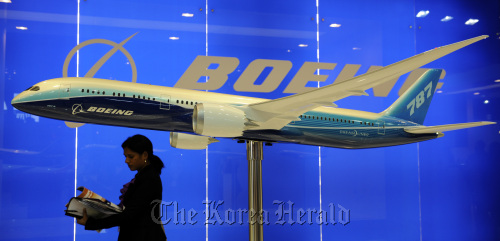WTO rules Boeing received $5b in subsidies, less than what arch-rival Airbus alleged
GENEVA (AP) ― A World Trade Organization appeals panel upheld Monday an earlier finding that U.S. planemaker Boeing Inc. received at least $5 billion in subsidies that hurt its European archrival and were prohibited under international trade rules, but it was far less than the European Union had alleged in its complaint.
The amount is also less than the $18 billion in illegal state support over four decades that the U.S. has alleged that rival Airbus, based in Toulouse, France, received during the same period. A WTO appeals panel ruled in a parallel case in May on a complaint brought by the U.S. that Airbus also received state subsidies that from the EU that hurt Boeing, but not all of them were illegal.
As usual, Brussels and Washington each claimed a measure of victory in their seven-year-old tit-for-tat dispute over financial aid to their respective airplane manufacturers. The two companies have been locked in a long-running trans-Atlantic trade dispute over a market believed to be worth more than $3 trillion over the next decade.
Monday’s ruling means the WTO has now dealt with appeals in each other’s cases and found that both governments are at fault in doling out billions of dollars of support to their respective aircraft-making industries, in violation of international trade rules.
GENEVA (AP) ― A World Trade Organization appeals panel upheld Monday an earlier finding that U.S. planemaker Boeing Inc. received at least $5 billion in subsidies that hurt its European archrival and were prohibited under international trade rules, but it was far less than the European Union had alleged in its complaint.
The amount is also less than the $18 billion in illegal state support over four decades that the U.S. has alleged that rival Airbus, based in Toulouse, France, received during the same period. A WTO appeals panel ruled in a parallel case in May on a complaint brought by the U.S. that Airbus also received state subsidies that from the EU that hurt Boeing, but not all of them were illegal.
As usual, Brussels and Washington each claimed a measure of victory in their seven-year-old tit-for-tat dispute over financial aid to their respective airplane manufacturers. The two companies have been locked in a long-running trans-Atlantic trade dispute over a market believed to be worth more than $3 trillion over the next decade.
Monday’s ruling means the WTO has now dealt with appeals in each other’s cases and found that both governments are at fault in doling out billions of dollars of support to their respective aircraft-making industries, in violation of international trade rules.

The European Union had alleged that Boeing had been given $19.1 in illegal federal and state subsidies between 1989 and 2006, including $10.4 billion from the NASA space program’s research and development. While the WTO appeals panel did say on Monday that Boeing received illegal aid, the sums were far smaller than the EU alleged.
“The appellate body has now spoken in both the Airbus and Boeing cases,” said Rainer Ohler, Airbus’ spokesman. “Comparing the core claims made by both sides, the net outcome is clear: Boeing’s cash grants are fundamentally illegal, while the system of loans to Airbus by European governments is legal and may continue. Boeing and the U.S. now will have six months to implement the WTO decision.”
Boeing, however, said in a statement that the WTO ruling “slashed earlier findings of harm to Airbus from U.S. subsidies. The decision confirms that in terms of amount, effect and nature, U.S. government support to Boeing is minimal in comparison to the massive European subsidies provided Airbus.”
Now that the ruling is in, Boeing and Airbus are each required to prove they are complying with WTO rules.
Boeing emphasized that the U.S. government has already removed some $2 billion in prohibited subsidies, leaving about $3 billion still to be addressed.
The European Commission, whose complaint to the WTO was the subject of the ruling, said it welcomed the confirmation that Chicago-based Boeing also received billions of dollars in illegal subsidies.
EU Trade Commissioner Karel De Gucht called Monday’s ruling vindication of the “EU’s long-held claims that Boeing has received massive U.S. government handouts in the past and continues to do so today.”
De Gucht said Airbus has lost $45 billion in sales due to illegal Boeing subsidies, and Boeing would not have been able to launch its 787 “Dreamliner” without government support. He added the ruling confirms that Boeing was due to get $3 billion to $4 billion in illegal aid due to tax measures from Washington State, where it was formerly based.
But his counterpart, U.S. Trade Representative Ron Kirk, called the ruling “a tremendous victory for American manufacturers and workers.” He also said that the U.S. already complied with part of the ruling by eliminating measures that made possible $2 billion of the more than $5 billion of prohibited subsidies.
Kirk said U.S. subsidies to Boeing have cost Airbus 118 lost aircraft sales, while EU subsidies for Airbus have cost Boeing 342 lost aircraft sales.
“It is now clear that European subsidies to Airbus are far larger ― by multiples ― and far more distortive than anything that the United States does for Boeing,” he said.
-
Articles by Korea Herald











![[Robert J. Fouser] Social attitudes toward language proficiency](http://res.heraldm.com/phpwas/restmb_idxmake.php?idx=644&simg=/content/image/2024/05/16/20240516050799_0.jpg&u=)






![[Herald Interview] Byun Yo-han's 'unlikable' character is result of calculated acting](http://res.heraldm.com/phpwas/restmb_idxmake.php?idx=652&simg=/content/image/2024/05/16/20240516050855_0.jpg&u=)
